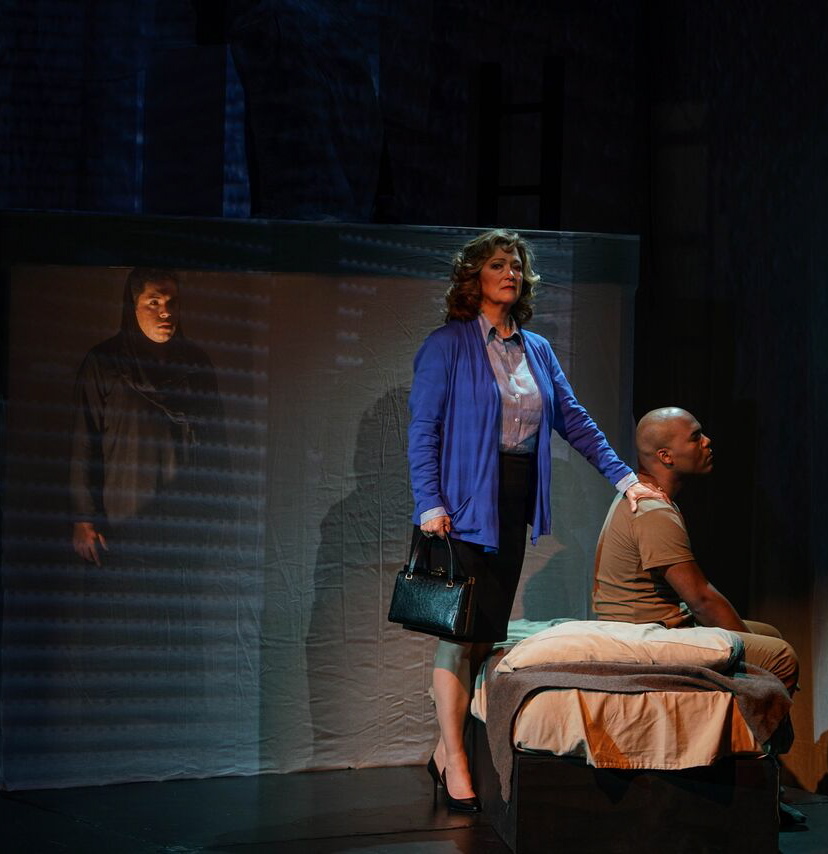New York City Opera explores raw, post-war emotions in “Fallujah”

Jonathan Lacayo, Suzan Hanson and LaMarcus Miller in Tobin Stokes’ “Fallujah” at New York City Opera. Photo: Sarah Shatz
It is safe to say that most Americans, so far, have never experienced the stupefying, crippling horrors of war firsthand. That said, millions have seen or felt the after-effects of those who did, and lived to return and bear witness.
Now those sorrowful legacies, specifically post-traumatic stress disorder (PTSD), have been dramatized by composer Tobin Stokes and librettist Heather Raffo in Fallujah, presented by New York City Opera Thursday night at The Duke on 42nd Street.
In 2004, the United States bombed the Iraqi city of Fallujah, an infamous incident that decimated civilians and provoked allegations of human rights violations. One of the U.S. soldiers who returned, emotionally wounded from the experience, was USMC (Ret.) Sergeant Christian Ellis, whose memories form the core of the story, and who served as a consultant to the production.
The 80-minute opera, performed in two acts without intermission, covers his flashbacks and their effects on those around him—his fellow soldiers, and his mother—with references to a young suicide bomber Ellis encountered in Iraq.
In the opera, Ellis is represented by a soldier named Philip, sensitively sung by bass-baritone LaMarcus Miller, who spends his time in a veterans’ hospital bed. Sleepless and tormented by the blurring of the past and present, he is under watch after his third suicide attempt. Sometimes his voice swells with the valor of being a soldier; at others it shrinks to a fearful, self-doubting whisper.
The swirling, confusing images in Philip’s head, often wallpapering the front and both sides of the stage, are sand-colored images of the town of Fallujah, sometimes turning phosphorescent green—perhaps a nod to night-vision goggles, or to his unsettled imagination. The video projections are by Hana S. Kim, collaborating with lighting designer Dan Weingarten and art designers Jon Harguindeguy and Michael Hebert, to completely fill the Duke’s intimate, black-box space.
But eventually the story begins to center around two characters: Colleen (Philip’s adopted mother) and Shatha, mother to the young Iraqi boy, Wissam, who is radicalized when his mother is killed. It soon becomes apparent that the two women have more in common than some might think, and that common pain becomes the emotional core. As Colleen, Suzan Hanson showed her vulnerability, and in one of the climactic scenes, combined her soprano with that of Ani Maldjian as Shatha, in polyphony made all the more effective since Stokes generally uses recitative to let the characters speak.
Stokes’s score relies more on the raw sinews of Raffo’s texts for its impact. (In stage comments prior to the opera, the Iraqi-American librettist Raffo revealed that she had over 100 relatives in Iraq before the attacks, and now has only one, which drew audible gasps from the audience.) The composer’s language encompasses Broadway, Persian riffs, and rock grooves; the chamber orchestra is augmented by an oud (a mandolin-like instrument with origins in the Middle East) and by both acoustic and electric guitars, a nod from Stokes to the tunes on the soldiers’ iPods.
As Philip’s comrades, Todd Strange (as Taylor), Gregorio González (Lalo), Jason Switzer (Rocks), and Arnold Livingston Geis (Corpsman) offered strong singing, often from spots high and low, including a catwalk that surrounds the room. (The sonic advantages of a smaller space are many.) As Wissam, the Iraqi boy decimated by the loss of his mother, Jonathan Lacayo let his voice bleed his dismay and confusion, and his father, Kassim, was sung with force by Zeffin Quinn Hollis.
Conductor Kristof Van Grysperre, associate conductor at the Long Beach Opera (which co-produced Fallujah, in a 21st-century partnership with the educational website explore.org), led the 11-piece orchestra with aplomb; the rest of the run will probably be a little more polished. And stage and production designer Andreas Mitisek, LBO’s artistic and general director, effectively transferred the spare Long Beach production to the intimate Duke stage.
Ultimately Fallujah feels like a bit of self-psychotherapy for all concerned expanded into a larger artistic realm. With the explicit horrors of war largely avoided in this staging, the music isn’t quite strong enough to suggest the harrowing conflicts by itself. Perhaps further revisions will bridge the gap since the topic is well worth operatic treatment.
So far this season, New York City Opera has admirably reined itself in, producing operas in unusual locations around town, and not biting off more than it can chew. Aleko and Pagliacci showed that a fresh look at traditional opera can be successful, and if Fallujah falls in the “exploratory, well-intentioned-but-almost-there” category, the company can be commended for striking out into emotional territory that few opera companies would consider.
Fallujah runs through November 20. nycopera.com; 646-223-3000







Posted Nov 19, 2016 at 12:20 pm by H Hodges
Interesting, provocative. I knew what an ouv is. Catwalk sounds useful.